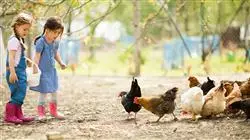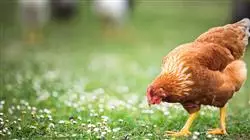University certificate
The world's largest faculty of veterinary medicine”
Introduction to the Program
Become one of the most demanded professionals of the moment: train as an Postgraduate diploma in Poultry Nutrition and Feeding"

This TECH Global University in Poultry Nutrition and Feeding is unique given its level of specialization and the logical sequence of learning with which the content is ordered.
Its ultimate goal is to specialize and update professionals in the most advanced technical and scientific aspects of animal nutrition and feeding.
Knowledge that enables the entry, linkage and specialization in one of the most important sectors of animal production at present and with more labor demand and need for specialization.
The current world population estimated at 7.6 billion is expected to increase to 8.6 billion by 2030 and animal nutrition is one of the disciplines called upon to help solve the problem of producing sufficient and economical protein to feed this growing demand in an efficient and sustainable manner.
With an innovative format, this specialization allows participants to develop autonomous learning and optimal time management.
Join the elite, with this highly efficient specialization and open new paths to your professional progress"
In short, it is an ambitious, broad, structured and interwoven proposal, which covers everything from the fundamental and relevant principles of nutrition to the manufacture of food. All this with the characteristics of a course of high scientific, teaching and technological level.
These are some of its most notable features:
- Latest technology in online teaching software
- Highly visual teaching system, supported by graphic and schematic contents that are easy to assimilate and understand
- Practical cases presented by practising experts
- State-of-the-art interactive video systems
- Teaching supported by telepractice
- Continuous updating and recycling systems
- Self-regulating learning: full compatibility with other occupations
- Practical exercises for self-evaluation and learning verification
- Support groups and educational synergies: questions to the expert, debate and knowledge forums
- Communication with the teacher and individual reflection work
- Content that is accessible from any fixed or portable device with an Internet connection
- Supplementary documentation databases are permanently available, even after the course
With a methodological design that relies on proven teaching techniques, this Postgraduate diploma in Poultry Nutrition and Feeding will take you through different teaching approaches to allow you to learn in a dynamic and effective way"
Our teaching staff is made up of professionals from different fields related to this specialty. In this way, we ensure that we provide you with the training update we are aiming for. A multidisciplinary team of professionals with training and experience in different environments, who will develop the theoretical knowledge in an efficient way, but above all, they will bring their practical knowledge from their own experience to the course: one of the differential qualities of this training.
This mastery of the subject is complemented by the effectiveness of the methodological design of this Expert. Developed by a multidisciplinary team of e-learning experts, it integrates the latest advances in educational technology. In this way, you will be able to study with a range of easy-to-use and versatile multimedia tools that will give you the necessary skills you need for your specialization.
The design of this program is based on Problem-Based Learning: an approach that conceives learning as a highly practical process. To achieve this remotely, we will use telepractice: with the help of an innovative interactive video system, and learning from an expert, you will be able to acquire the knowledge as if you were actually dealing with the scenario you are learning about. A concept that will allow you to integrate and fix learning in a more realistic and permanent way.
A course that will enable you to work in the poultry production sectors with the solvency of a high-level professional"

With the experience of active professionals, experts in Animal Nutrition and Veterinary Medicine"
Why study at TECH?
TECH is the world’s largest online university. With an impressive catalog of more than 14,000 university programs available in 11 languages, it is positioned as a leader in employability, with a 99% job placement rate. In addition, it relies on an enormous faculty of more than 6,000 professors of the highest international renown.

Study at the world's largest online university and guarantee your professional success. The future starts at TECH”
The world’s best online university according to FORBES
The prestigious Forbes magazine, specialized in business and finance, has highlighted TECH as “the world's best online university” This is what they have recently stated in an article in their digital edition in which they echo the success story of this institution, “thanks to the academic offer it provides, the selection of its teaching staff, and an innovative learning method aimed at educating the professionals of the future”
A revolutionary study method, a cutting-edge faculty and a practical focus: the key to TECH's success.
The most complete study plans on the university scene
TECH offers the most complete study plans on the university scene, with syllabuses that cover fundamental concepts and, at the same time, the main scientific advances in their specific scientific areas. In addition, these programs are continuously being updated to guarantee students the academic vanguard and the most in-demand professional skills. In this way, the university's qualifications provide its graduates with a significant advantage to propel their careers to success.
TECH offers the most comprehensive and intensive study plans on the current university scene.
A world-class teaching staff
TECH's teaching staff is made up of more than 6,000 professors with the highest international recognition. Professors, researchers and top executives of multinational companies, including Isaiah Covington, performance coach of the Boston Celtics; Magda Romanska, principal investigator at Harvard MetaLAB; Ignacio Wistumba, chairman of the department of translational molecular pathology at MD Anderson Cancer Center; and D.W. Pine, creative director of TIME magazine, among others.
Internationally renowned experts, specialized in different branches of Health, Technology, Communication and Business, form part of the TECH faculty.
A unique learning method
TECH is the first university to use Relearning in all its programs. It is the best online learning methodology, accredited with international teaching quality certifications, provided by prestigious educational agencies. In addition, this disruptive educational model is complemented with the “Case Method”, thereby setting up a unique online teaching strategy. Innovative teaching resources are also implemented, including detailed videos, infographics and interactive summaries.
TECH combines Relearning and the Case Method in all its university programs to guarantee excellent theoretical and practical learning, studying whenever and wherever you want.
The world's largest online university
TECH is the world’s largest online university. We are the largest educational institution, with the best and widest online educational catalog, one hundred percent online and covering the vast majority of areas of knowledge. We offer a large selection of our own degrees and accredited online undergraduate and postgraduate degrees. In total, more than 14,000 university degrees, in eleven different languages, make us the largest educational largest in the world.
TECH has the world's most extensive catalog of academic and official programs, available in more than 11 languages.
Google Premier Partner
The American technology giant has awarded TECH the Google Google Premier Partner badge. This award, which is only available to 3% of the world's companies, highlights the efficient, flexible and tailored experience that this university provides to students. The recognition as a Google Premier Partner not only accredits the maximum rigor, performance and investment in TECH's digital infrastructures, but also places this university as one of the world's leading technology companies.
Google has positioned TECH in the top 3% of the world's most important technology companies by awarding it its Google Premier Partner badge.
The official online university of the NBA
TECH is the official online university of the NBA. Thanks to our agreement with the biggest league in basketball, we offer our students exclusive university programs, as well as a wide variety of educational resources focused on the business of the league and other areas of the sports industry. Each program is made up of a uniquely designed syllabus and features exceptional guest hosts: professionals with a distinguished sports background who will offer their expertise on the most relevant topics.
TECH has been selected by the NBA, the world's top basketball league, as its official online university.
The top-rated university by its students
Students have positioned TECH as the world's top-rated university on the main review websites, with a highest rating of 4.9 out of 5, obtained from more than 1,000 reviews. These results consolidate TECH as the benchmark university institution at an international level, reflecting the excellence and positive impact of its educational model.” reflecting the excellence and positive impact of its educational model.”
TECH is the world’s top-rated university by its students.
Leaders in employability
TECH has managed to become the leading university in employability. 99% of its students obtain jobs in the academic field they have studied, within one year of completing any of the university's programs. A similar number achieve immediate career enhancement. All this thanks to a study methodology that bases its effectiveness on the acquisition of practical skills, which are absolutely necessary for professional development.
99% of TECH graduates find a job within a year of completing their studies.
Postgraduate Diploma in Poultry Nutrition and Feeding
.
The poultry sector is a fundamental mainstay in the food industry, and the nutrition and feeding of poultry is essential to ensure their proper development and production. For this reason, TECH has created the Postgraduate Diploma in Poultry Nutrition and Feeding, aimed at veterinary professionals seeking to update and perfect their technical and practical knowledge in this field. The program addresses the main aspects related to the nutrition and feeding of the main poultry species destined for the production of animal protein, such as broilers and laying hens. In addition, the program will also cover differentiated nutrition in broilers to obtain a higher yield of cuts, as well as the use of special feeds, the transport of newly hatched birds and the transport of finished birds before slaughter. With this program, veterinary professionals will be able to learn the most advanced techniques and strategies to guarantee a healthy and balanced diet in production poultry, maximizing their performance and quality. In addition, they will be able to acquire skills in the evaluation and control of feed quality, as well as in the management of risks associated with poultry feeding.
Delve into the poultry industry as a veterinarian
.
The Postgraduate Diploma in Poultry Nutrition and Feeding is presented in a 100% online format and with flexible scheduling, which allows students to combine their training with their work and personal activity. In this way, they will be able to advance in their professional career within the poultry sector, improving their profile and knowledge in a fundamental area for the production of animal protein. In summary, the Postgraduate Diploma in Poultry Nutrition and Feeding is the ideal postgraduate course for those veterinary professionals who wish to specialize and update their knowledge in this area, and thus improve their professional profile and advance their career within the poultry industry.







